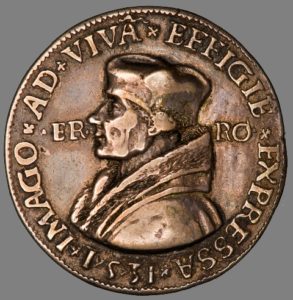ERASMUS: ‘GRACCULUS’ OR ‘GRAECULUS’?
In chapter 83 of the third book of his Poetices libri Septem, Scaliger launches a severe attack on Erasmus’s definition of a proverb, without even mentioning the name of the Dutch humanist: “grammatici, idest Donatus et is Gracculus qui Donati adducit definitionem, aeque ineptiunt.” Its modern editor, Luc Deitz, has silently corrected “Gracculus” to “Graeculus”, and translated disparagingly: “jenes Griechlein”.
The capitalization of the word “Gracculus” and the presence double “c” in the 1561 edition might have played a role in Deitz’s editorial decision, but much more important, no doubt, were Scaliger’s previous remarks, accusing Erasmus of philhellenism to the detriment of Latin.
In a recent contribution Ari Wesseling drew attention to this unnecessary emendation, and supposed that Scaliger, in calling Erasmus “gracculus”, was alluding to the proverb “nihil graculo cum fidibus” (“an ignorant crow has nothing to do with poetry”), and that Scaliger thus referred to Erasmus as an ignorant crow.
Another solution, however, seems to commend itself, as being more appropriate and also more in accordance with Scaliger’s description of Erasmus on other occasions. In the same chapter under discussion, for instance, Scaliger wrote of Erasmus: “quibus ille, quemadmodum in omnibus suis scriptis solet… satagens coacervator nullo apposito iudicio…”. Obviously Scaliger regarded Erasmus as a man who had only brought together a lot of material, confining himself to the repetition of other authors, without ever expressing a judgment of his own. And in his first oration against Erasmus (1531) he had already addressed him as “vetule psittace” (“old parrot”).
Following this line it seems obvious that Scaliger, rather than presenting Erasmus as an ignorant crow, wanted to stress the fact that Erasmus’s work for the most part was no more than a patchwork, and that he was showing off by plagiarizing other people’s writings. That is exactly the theme of one of the most famous fables present in Phaedrus’s Fabulae Aesopiae. The third fable of the first book indeed is entitled: “Graculus superbus et pavo”, and tells the story of the vainglorious jackdaw who decks himself out in borrowed plumes.
Although Phaedrus’s fables did not appear into print before 1596 (date of the editio princeps by Pierre Pithou), the were widely known through the prose paraphrases circulating during and after the Middle Ages, especially the “Aesopus Latinus” by Romulus. Erasmus himself, in discussing the adage “Aesopicus graculus” (adag. 2591 = ASD II, 6, p. 386) referred only to Pindar, Lucian and Horace, confining himself — as was his policy — almost exclusively to classical and biblical writings. We thus may conclude that Wesseling was correct in rejecting the emendation “Gracculus” into “Graeculus”, although not for the right reasons.
Gilbert Tournoy
Katholieke Universiteit Leuven
Seminarium Philologiae Humanisticae
E-mail: Gilbert.Toumoy@arts.kuleuven.ac.be
Humanistica Lovaniensia, Volume 52, 2003, pp. 405-406.

